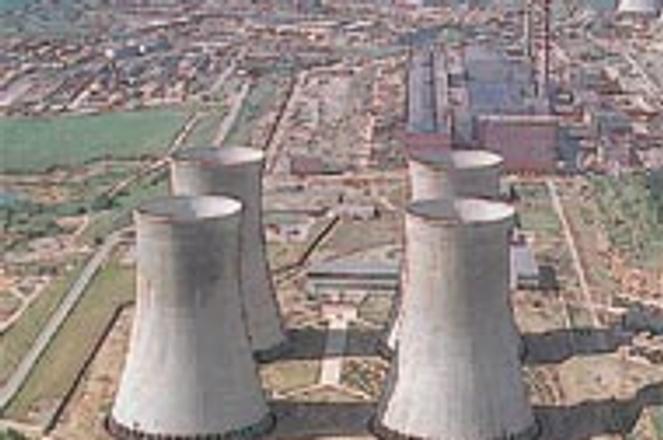Mochovce power plant in western Slovakia.
The Slovak government has not decided whether to complete the remaining two reactor units of the nuclear power plant in Mochovce, Prime Minister Vladimír Mečiar said at the end of the Central European Initiative (CEI) summit held in Graz on November 9.
Austrian Chancellor Franz Vranitzky quoted Mečiar as having told him at a meeting the week before in the west Slovak town of Piešťany that completion of units 3 and 4 at the nuclear power plant was not planned. The Slovak government has only assigned experts from the German company Siemens to work out a survey on the possible extension of the Mochovce project, Vranitzky quoted Mečiar as saying.
"The information by Vranitzky was correct," Mečiar said, yet conceding that finishing all four blocks at Mochovce would allow Slovakia to meet all its energy needs.
Austria, a staunch opponent of nuclear-generated power, is especially worried over the plant at Mochovce, because of its location 80 kilometers from the Slovak-Austrian border and because it is being built with primarily Russian technology after the Slovak government turned down the European Bank for Reconstruction and Development's proposal to complete the project. Instead, Mečiar has enlisted western European firms such as Siemens, Gaz de France and the Czech company Škoda to help complete the nuclear power station.
Mečiar's statement came hard on the heels of an alleged admission by Slovak Environment Minister Jozef Zlocha that the government planned to put reactors three and four on line, according to a news agency in Vienna.
This sparked a swift response from Austrian leaders, to the point of hinting that any movement forward could cause the European Union's (EU) newest member to veto Slovakia's own EU admission.
"Slovakia must remember that nuclear safety is a central part of EU membership," said Austrian environment minister Martin Bartenstein. "Austria's position is such that in the framework of entry negotiations, an absolute minimum requirement would be proof of Western safety standards. This is essential and a central part of any application."
Siemens under fire
Though Bratislava now says it is only carrying out a study at the plant, one environmental activist said that's as good as having already decided to push ahead. "You do not commission a survey like this if you are not planning to act on the results," Manuella Kraeuter, spokeswoman for the environmental lobbying group Global 2000, told The European daily newspaper.
Kraeuter also criticized Siemens for taking part. "Siemens cannot get involved in building nuclear power projects in Germany because there is extremely strong opposition from the population," she said, "so they turn to countries that have much lower standards."
She pointed out the Germans had already shut down the east German power plant at Greifswald, which is the same type of reactor as Mochovce, because of safety fears, and highlighted that the German government had offered Siemens an export guarantee for its work on Mochovce.
"The Germans are employing a double standard by refusing to allow this type of reactor on their own soil and then supporting it in a country where democratic principles are not as strong," Kraeuter said.
Siemens spokesman Wolfgang Breyer, speaking on Austrian television, said: "There are no problems in mixing Eastern and Western technology."
He also defended his firm's role in the project. "Do the Austrians really want the blocks to come in use without the safeguard of security technology?" Breyer asked.
Where the energy will go
Slovakia claims it needs the reactor to help meet its own energy needs, and denies it plans to sell surplus electricity abroad - notably to the Bavaria region in the Czech Republic.
According to Global 2000's Kraeuter, two working reactors at Mochovce would fill the domestic shortfall, and any extra plans would make nonsense of claims that the plant was only for domestic use.
Austria is the only country to outlaw nuclear power following a referendum in 1978, and Vienna now hosts the world's nuclear watchdog institution, the International Atomic Energy Agency (IAEA).
Test case
Mochovce is seen as a test case by both proponents and opponents of nuclear energy in an ambitious plan to modernize an estimated 56 outdated Soviet-built nuclear power plants in the region.
"There has never been a fusion of Eastern and Western technology, and the nuclear industry desperately wants Mochovce to go ahead in order to prove it works," Kraeuter said. "They cite the one in Finland as an example, but this was built by mixing technology from the East and West, unlike Mochovce which is a totally Soviet design. We know what they want to do won't work, and we are determined to stop it."
Compiled by Richard Lewis from Central European News and ČTK.


